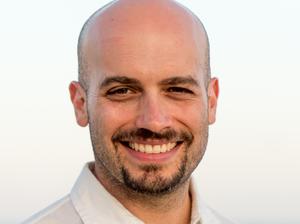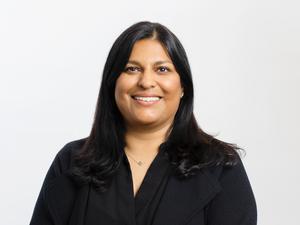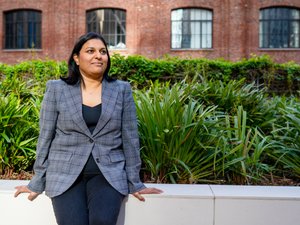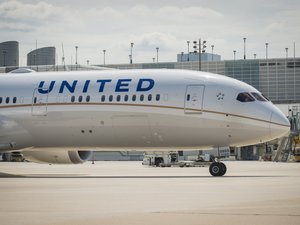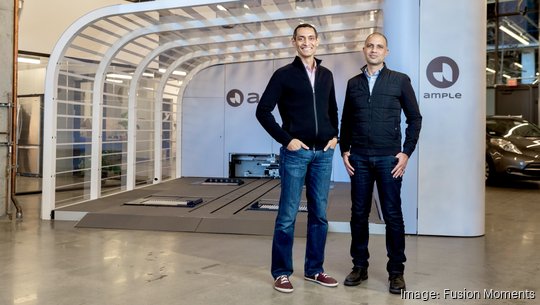
The California Energy Commission has recommended that a San Francisco startup developing battery-swapping infrastructure for electric vehicles be awarded a grant from the state to scale up its manufacturing capabilities in the Bay Area.
The proposed grant would give Ample $15 million towards building out its facility in Brisbane. The company currently has around 200 employees and the state grant will allow it to create 60 new full-time jobs in Brisbane, primarily for materials handlers and assembly line workers.
Ample has more than 30,000 square feet of manufacturing space in its facility at 99 Park Lane in Brisbane.
“While equity investment enables us to develop technology and take risks … government funding serves a somewhat different purpose for us, which is being able to invest in scaling a proven technology and doing so in locations that would otherwise not be viable options,” said co-founder and CEO Khaled Hassounah. It also "presents a vote of confidence that battery swapping is a viable path to reach the state’s electrification goals."
Ample is one of 13 companies in California that the commission recommended for grants in January for "zero-emission transportation manufacturing" projects, according to public documents. Other Bay Area companies recommended for the grants include ChargePoint, Inc. in Campbell, Moxion Power Co. in Richmond, Monarch Tractor in Livermore and Cuberg, Inc. in Emeryville. The proposals still need to receive final approval when the commission meets in May.
In a December report, the commission wrote that battery swapping is one of a few emerging technologies that could support wider adoption of electric vehicles.
"Battery swapping has the potential to be grid-friendly and allows rapid and convenient charging for the consumer," the report said. "Wireless charging can offer convenience to consumers by providing a 'touchless' charging experience and potentially charging many different types of vehicles and equipment. However, like battery swapping, it would require deployment of new infrastructure and standards."
Mobile, or "transportable," charging could be another source of low cost energy.
The report also noted that battery swapping is already utilized in China, where more than 30% of all zero-emissions heavy-duty trucks sold in 2021 were outfitted with the capability.
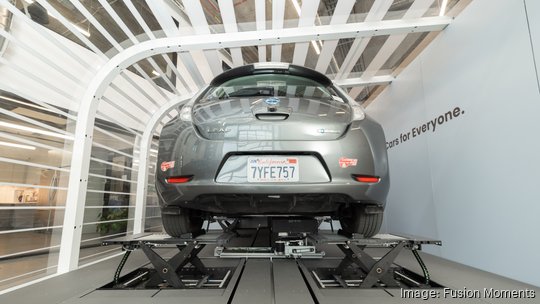
Ample is bringing this technology and infrastructure to California.
It is developing automated robotic battery swapping stations, and also assembles the custom battery packs that are required. Those can be installed directly by car manufacturers when a vehicle is purchased and car manufacturers won't have to change their designs to do so. Ample will be announcing its first car manufacturing partners later this year, Hassounah told me.
As Ample ramps up its operations in the Bay Area, Hassounah is eyeing expanding into more areas of California next. And by the end of the year, the company will have operations in Europe and Asia, as well, he told me.
"Our goal is to address the energy delivery challenge, and make owning an EV as cheap, fast and convenient as owning a gas vehicle," Hassounah said.
The battery-changing process currently takes about 10 to 12 minutes but the company is trying to cut that down by half to make it just as fast and convenient as filling up a tank of gas, Hassounah said.
Tesla's "superchargers" can provide 200 miles of range from 15 minutes of charging, according to its website. And Nissan claims that its fastest option takes 40 to 60 minutes.
Battery range and access to charging stations remain a barrier for many consumers. Commercial fleets with electric vehicles also need energy capabilities at scale.
“While we are strong believers in charging and advocate for its wide deployment, we also believe that there are many use cases that cannot be served by charging alone,” Hassounah said, such as “people who park on the street, live in multi-unit dwellings, and fleets.”
Hassounah and John de Souza founded Ample in 2014 to help bridge the gap between demand for electric vehicles and the infrastructure needed to support battery-powered electric energy.
The company is primarily focused on fleets of passenger vehicles but will also support heavy duty trucks, as well. In 2021, it partnered with Uber to make electric vehicles with Ample's technology available for drivers to rent.
Ample has raised more than $275 million in total equity funding, including $50 million in a private equity round from Blackstone and Banco Santander in 2021 that reportedly valued the company at more than $1 billion, according to Reuters. It also raised a $35 million Series B in 2020, followed by a $160 million Series C in 2021.
Its other investors include Moore Strategic Ventures, XYZ Venture Capital, New Ground Ventures, Shell Ventures, Transform VC, Rosa Park Advisors and Repsol Energy Ventures.
